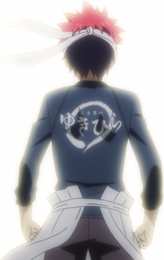Review for Food Wars! Season 1 - Collector's Edition
Introduction
A few months ago, I had the distinct pleasure of reviewing Tampopo, a classic Japanese film celebrating the culinary arts, the appreciation of food, and the sensuality of the appetite. It was delightful, whimsical, and funny, and I put the review disc to one side, certain that I’d go a few years, if not decades before seeing something akin to Tampopo again. Four months later, Animatsu bring us Food Wars, an anime all about cooking, where flavours can be out of this world, orgasmic, sending the taster in search of the wildest, most bizarre simile in the hope of describing what they have just sampled. The thing about food, about taste, about cooking, eating, the rituals that we create, the traditions that we follow, is that it is truly universal. It’s something everyone can appreciate. Not everyone will enjoy a tale about a ninja, not everyone will get aboard the giant robot, and not everyone will sparkle with anime vampires. But everyone eats, everyone has tastes, everyone has a sense of smell, and everyone can appreciate good cooking. With that kind of universality, you’re bound to find something to enjoy in Food Wars, unless the producers go very wrong.
Soma Yukihira has his life all planned. His father owns a popular restaurant, and Soma’s inherited his father’s love of the culinary arts. He loves to cook in the restaurant, engage in impromptu recipe battles with his dad, and to the detriment of his friends, has a hobby in trying out weird taste combinations (peanut butter squid!). He’ll attend high school, but continue working at the restaurant, and probably eventually inherit it...
Only his dad goes and closes the restaurant down for three years, while he goes on a gastronomic tour of the world. Soma will instead be enrolled into the elite Tohtsuki Fine Dining Academy, where he will either hone his culinary skills or be expelled. And Tohtsuki Academy has a reputation of only graduating 10% of its students. On top of that, elite really does mean elite. Most of these toffs turn their noses up at this plebe from the sticks. Granddaughter of the school founder, Erina Nakiri quickly decides to make it her mission to have this upstart expelled, but Soma’s hard won knowledge quickly impresses, especially when he moves into the misfits’ Kyokusei dormitory...
24 episodes of Season 1 of Food Wars are presented across three Blu-ray discs as follows.
Disc 1
1. The Vast Wasteland
2. God Tongue
3. That Chef Doesn’t Smile
4. Sacred Mother of Kyokusei
5. The Ice Queen and the Spring Storm
6. The Meat Aggressor
7. The Silent Bowl, The Eloquent Bowl
8. A Concerto of Concept and Creation
9. The Breading that Showcases the Mountains
Disc 2
10. The Supreme Recette
11. The Magician That Came From the East
12. The Memory of a Single Dish
13. Eggs Before the Dawn
14. Metamorphose
15. The Man Called “Carnage”
16. The Cook Who Traveled Thousands of Miles
17. Sensual Fried Chicken
18. The Fried Chicken of Youth
Disc 3
19. The Chosen One
20. Dragon Lies Prone then Ascends to the Sky
21. That Which is Known Yet Unknown
22. That Which Transcends the Norm
23. The Unfolding Individual Competition
24. The Warriors’ Banquet
Picture
Food Wars gets the usual 1.78:1 widescreen 1080p transfer. It’s a fine transfer, clear and sharp throughout, with bright, consistent colours, and smooth animation. There are no visible signs of compression, and certainly no digital banding. The characters are pretty standard for comedy anime, appealing and well designed, but the real effort has gone into the food. There are a whole variety of dishes on offer here, and I never thought that artistic representations of food could be as appetising as the real thing. Food Wars will make your mouth water. The big conceit comes in the taste tests, where visual similes are used to describe what is being sampled. The animation gets pretty imaginative (and naked) at this point.
The images in this review were kindly supplied by Animatsu.
Sound
You have the usual Sentai options of DTS-HD MA 2.0 Stereo English and Japanese, with subtitles or signs locked to the appropriate track. I gave the English dub a quick try later on, and with an extremely monotone and uninterested Akira Hayama, my first and only impression is that this harks back to the bad old days of Sentai’s cheap and cheerful, ‘churn ‘em out quick’ dubs. Fortunately the Japanese audio is a lot more palatable, with actors suited well to their particular character archetypes. The show’s music is pretty impressive as well, getting suitably over-the-top when it comes to taste testing. The subtitles are accurately timed, but you might spot the odd typo. ‘Masala’ spelt as ‘Marsala’ springs to mind.
Extras
The discs present their content with static menus, and each episode is followed by a translated English credit reel.
Disc 3 holds the extra features, which boil down to the textless credit sequences. But... you do get all 24 textless openings in a reel that runs to 36:50, and all 24 textless closings running to 43:49.
You also get trailers for Amagi Brilliant Park, Himouto! Umaru-chan, Girls und Panzer der Film, and School Live!
Conclusion
This is the worst possible show. You simply have to avoid Food Wars... if you’re on a diet that is. For an animated show about the art of gastronomy, the culinary rivalry between trainee chefs as presented through a shonen sports genre filter, this is still a show that will get your mouths watering, will induce you into trying new taste combinations and food experiments, will get you into the kitchen, inexpertly wielding dangerous kitchen implements in the mistaken belief that you too might be a wizard chef. Food Wars, food battles, the tournament cliché as applied to cooking might seem a little extravagant, especially when you see the orgasmic effects that some of the food created here has. But we love a good cooking competition, don’t we, ladies and gentlemen (he says in his lamest Ainsley Harriot impersonation). We’ve been drawn to the possibilities of breathtaking success, and abject failure in the kitchen since the days of Masterchef, and if The Great British Bake Off is anything to go by, that isn’t going to change anytime soon.
Soma Yukihira might have expected to apprentice his way through his adolescence in his father’s restaurant with a view to eventually taking over, but his father has other ideas, taking a three year sabbatical, closing the restaurant, and telling his son to try and make it to the top of the elite Tohtsuki Academy. It’s the standard mission to go out into the world and broaden one’s horizons. Soma might have thought that he knew it all, but it isn’t long until he realises just how much more there is to learn, which given his cocksure attitude when he starts school could have meant a quick and ignominious fall. Fortunately his experiences working with his father have given him the skills, and the adaptability to learn and excel.
With Tohtsuki Academy only graduating the top 10% of its students, failing all the rest, he’s certain to be challenged. As well as the elitist policy of the school, it also allows for the Food Wars, the chef battles to establish status and win perks, outside of the normal lessons and tests. Soma finds plenty of friends and rivals to compete against in the school, beginning with the ultra-elite Erina Nakiri, granddaughter of the school’s founder. She may be a first year, but she’s already a big-shot in the culinary world, and it’s she who’s vetting the lowly transfer students trying to get in on talent alone (unlike those who come up through the elites). She instantly has it in for Soma, and were it not for her grandfather who sees Soma’s true potential, he would have fallen at the first hurdle. Erina is the tsundere character, who refuses to acknowledge Soma’s talent, or indeed acknowledge that she might in some way like him. Unlike most series though, we don’t really see her thaw towards him much.
That’s because Food Wars’ narrative pace is really quite slow. We only get the first few months of Soma’s life at the Academy, getting to know the other students, the teachers, his first few lessons, his first few challenges, exams, and tests. When a cooking challenge might unfold over two or more episodes, you can see why Food Wars doesn’t exactly zip along in terms of time in the story world. However that is wholly separate from the pace of the storytelling and holding the viewer interest, which this show is great at. But it has to be said the first season concludes with the first round of the Fall Selection competition, and that the final round takes place in season 2. Incidentally, Season 3 is in production.
It’s a big school with a big cast, but Food Wars gets its pacing spot on, in the way that it introduces new characters into the mix, and lets them develop before adding in more. This would be the perfect place for a cooking analogy, about putting the ingredients in at the right time. I’ll let you make up your own. After the antagonistic Erina, Soma meets Megumi Tadokoro, the likeable, kindly girl type, who has been on the verge of expulsion due to her lack of confidence, and nervous disposition. Being partnered with Soma helps her find her confidence and begin to succeed, and the two become friends. Megumi lives at the Kyokusei dormitory, which in true school anime tradition, is the rundown dumping ground for the quirky outcasts, which is where Soma winds up living as well, and it’s here we get our next batch of characters, most notably the naked apron guy, Satoshi Isshiki, a second year student who’s on the student council alongside Erina. Then there is Ikumi Mito, a girl who is an expert with meat dishes, and who incongruously cooks in a bra top (and must have asbestos skin when it comes to spitting fat). There are the Italian brothers Takumi and Isami Aldini, with Isami getting in full on rival mode when it comes to Soma. The show knows exactly when to add another shot of character spice to liven up the story, and it continues this way through the series.
The joy of the show comes in how it focuses on the food, and on the cooking. It looks fantastic on screen, the most appetising animated food I have ever seen, and you might be tempted to try out a few recipes yourself, it goes into that much detail. The structure of the show is full on competition interspersed with brief episodes of character comedy. Two characters will face off in a Food War, or have to excel in class, or take part in a contest, and it all comes down to who makes the best food. This food has to be judged of course, and Food Wars goes to town with the visuals, rendering the judges stripped naked by the taste profusions of the better quality dishes, as they search for whatever ridiculous and daft metaphors they can to describe what they have just tasted. Think Jilly Goolden describing wine on Food and Drink (obviously without the nudity), and you’re in the right ballpark.
Eventually I discovered Food Wars’ weak point. As long as they are cooking food that you are unfamiliar with, you can marvel at how intricate, how fabulous it looks, and you can begin to imagine how it might taste. But if you know the food that they are making, then you might start getting critical. The end of this series, the start of the Fall Selection, is a curry making challenge. Even putting to one side the fact that Indian Curry and the Japanese idea of Curry went down two different evolutionary paths sometime around the Cretaceous Era, most of the curry creations in this show tended to turn my stomach. It’s a bit of a sour note to end the first series on for me, and hopefully this is the only curry competition in the story.
Manganimatsu do it again! They’ve brought over a long running sports anime (albeit one with cooking) that is brilliantly made, with great characters, and an engrossing and entertaining story. And once again, with the first series out of the way, now comes the interminable wait for them to license and release the subsequent seasons. Food Wars is almost as good as Haikyu, and I am just as desperate to see more of this delicious show.
























































Your Opinions and Comments
Be the first to post a comment!